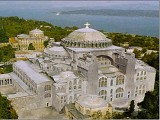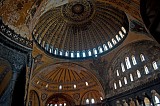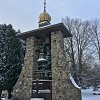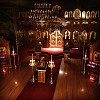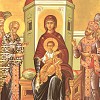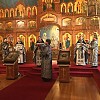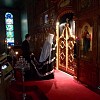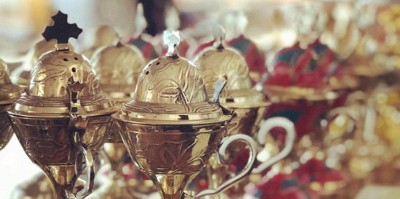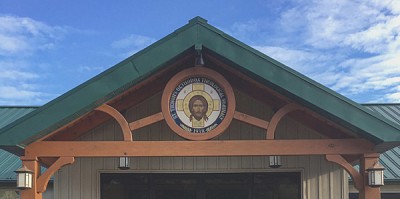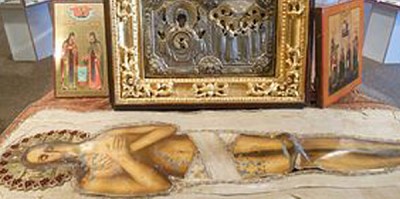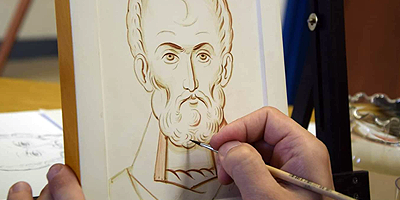Byzantine Lenten practices can inspire us to do better
Here is some information about the Great Fast of Lent in earlier times which serves as an inspiration to us today.
- The 40 Day Fast was from Apostolic Tradition -
"Do not neglect the Forty Days", wrote St. Ignatius the God-bearer in his epistle to Philippians: "for it establishes the imitation of the life in Christ". St. Ambrose of Milan spoke even more clearly: "The Lord has blessed us with the Forty Day Fast. He created it for your salvation to teach us to fast not in words only, but also by example". Sts Basil the Great and Gregory of Nyssa assert that the Holy Forty Day Fast existed everywhere during their time. According to the Apostolic Canons (Canon 69) the Holy Forty Day Fast is considered obligatory and its observance is protected by strict punishment.
- The Services of the Church are Somber and Penitential -
"She also changes the choice of the readings themselves according to the season. Thus, the Holy Church deprives the faithful of the joyful proclamation of the Gospel of Christ, and offers readings from the Old Testament word of God. She uses the Psalter especially widely, which mainly induces a prayerful and repentant spirit. The entire Psalter is read twice each week. The terrible speech of the Prophet Isaiah is also read, accusing the lawless and encouraging the hope of repentance. The pericopes in which the creation and the fall of man is described in the book of Genesis are read, and on the one hand, the awful displays of the wrath of God on the impious are described, and on the other hand, His mercy on the righteous. Finally, lessons from the book of Proverbs are read, where the Wisdom of God calls us to true enlightenment, teaches us about heavenly wisdom. In all the church services the Holy Church leads us to the prayer of St. Ephraim the Syrian, that God take away from us the spirit of sloth, despair, lust of power and idle talk, and that He grant us the spirit of chastity, humility, patience and love. Also frequently repeated is the prayer of repentance of David: "Have mercy on me, O God, have mercy on me", and the appeal of the reasonable thief: "Remember me, O Lord, when Thou comest into Thy heavenly Kingdom". All Divine Services of Great Lent are done quietly, slowly and with the greatest reverence. Few candles are lit in the candle stands, the Royal Doors are rarely opened, the bells are seldom and minimally rung, those present in the temple are called to prostrate to the ground frequently, and to kneel often.
- The Great Fast encompassed all areas of life in Byzantium -
According to the witness of St. John Chrysostom, some people during his time were content with only bread and water during the entire Holy Forty Day Fast, and "on other hand, although the fast was coming there were those who tried a thousand times to get him to drink wine or to eat something not appropriate for the fast, the sooner he decided to undergo all that, rather than to taste the forbidden food"...In every possible way abstaining from food and strictly limiting its choice, ancient Christians, agreeing with the canons of the Holy Church, limited themselves in even all the purest and holy joys, considering even such actions as incompatible with quiet sorrow of the days of repentance. From the most ancient times as it has been told by us before, on the weekdays of the Holy Forty Day Fast the full liturgy was attended by ancient Christians with spiritual gladness and festive agape meals (Laodacia 19, Trullo 52), on those days the commemoration of the holy Martyrs were not celebrated (Laodacia 51).
And during all of the Holy Forty Day Fast it was strictly forbidden "to perform marriages, or to celebrate birthdays" (Laodacia 52). To not give an occasion to believers to absentmindedness and entertainments, the canons of the Holy Church have forbidden all shows and common games. And ancient Christians counted it an inexcusable sin for themselves during the days of general repentance, humility, soulful weeping and lamentation for sins, to afford the earthy entertainments and worldly pleasures with which pagans betrayed themselves at this time of prodigality with the darkness of superstition and impiety. Subsequently the Emperor Theodosius the Great prohibited public shows through the imperial code of laws. Similarly fairs were prohibited in lent, and also suits and litigation was stopped during this time. During the same time of the Holy Forty Day Fast was the time of the greatest display of Christian mercy and love: the sovereigns released captives, forgave debtors, facilitated the destiny of criminals, removed fetters from those in prison; bishops reconciled penitents with the Church, released the reformed from heavy interdicts and public penance; all believers considered it their primary duty at this time to help the poor, the needy, to visit the sick, to comfort pilgrims, to mediate conflicts, to stop all mutual quarrels and disputes, to manage slaves with special kindness, etc.
- Personal Practices Impacted Everyday Life -
Several times a day the faithful gathered in the temple for divine services, for public prayers and hearing the word of God, filling these practices with obligatory personal prayers; assiduously preparing themselves for worthy reception of the Holy Mysteries and during the Holy Forty Day Fast repeatedly receiving communion during the full liturgy and at the Liturgy of the Presanctified Gifts. Full silence reigned during this time even in the special life of Christian societies. St. John Chrysostom in one of the commentaries says: "What blessing does not occur for us in lent? Everywhere there is silence and pure clarity. And are not the dwellings also free from noise, bustle and any anxiety? But before yet the dwelling, the spirit of the one who fasts tastes calmness, and that all the cities everywhere should reveal such decency, as what exists in spirit and in the dwellings: neither the audible singing in the evening, nor the afternoon commotion and drunkenness. There is no audible shouting, nor quarreling, but everywhere great silence".
-Source: S. V. Bulgakov, Handbook for Church Servers, 2nd ed., 1274 pp. (Kharkov, 1900)
|
| |||||||||||||
175 St. Tikhon's Road
Waymart, PA 18472
Sat
20Apr7:40 Hours & Divine Liturgy
4:00 VigilSun
21Apr9:10 Hours and Divine Liturgy
4:30 Vespers & Small ComplineMon
22Apr6:00 Midnight Office, Matins and hours
4:30 Vespers & Great Compline

